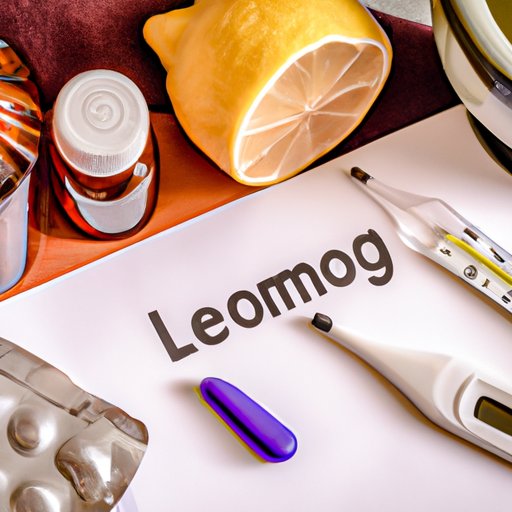
Introduction
Stomach bugs or gastroenteritis are infections that cause inflammation of the stomach and intestines. Symptoms include nausea, vomiting, diarrhea, and stomach cramps. Stomach bugs are usually caused by viruses or bacteria and are highly contagious. This article will discuss various methods to get rid of stomach bugs, including natural remedies, over-the-counter medications, home remedies, preventative measures, nutritional supplements, and the BRAT diet.
Natural Remedies
Natural remedies are a great way to alleviate stomach bug symptoms without taking medication. It is important to drink clear liquids such as water, herbal tea, and broths to prevent dehydration. Rest is also crucial as it allows the body to recover and heal. Gargling with salt water can relieve sore throats caused by vomiting, and applying heat pads or hot water bottles to the stomach area can help reduce abdominal pain. Additionally, avoid solid foods until vomiting has stopped for six hours, and gradually reintroduce soft foods such as toast, rice, and bananas.
Over-the-Counter Medications
Over-the-counter medications can offer relief from stomach bug symptoms such as nausea, vomiting, and diarrhea. Antacids, such as Pepto-Bismol, can help reduce stomach acid and relieve nausea. Anti-diarrheal medications such as Imodium can help control diarrhea, and pain-relievers such as aspirin and ibuprofen can relieve stomach cramps. However, it is essential to consult with a doctor before taking any medications for stomach bugs, especially for children, elderly, and patients with underlying health conditions.
Home Remedies
Home remedies can also bring relief from stomach bug symptoms. Ginger tea can help ease nausea and vomiting, and apple cider vinegar can help regulate the stomach’s pH levels. Probiotics such as yogurt or kefir can promote a healthy gut environment and have been shown to improve symptoms. However, it is essential to research these remedies and their potential side effects or harmful interactions with other medications. Additionally, it is essential to seek medical advice when symptoms persist or worsen.
Preventative Measures
Preventing a stomach bug infection is crucial as it reduces the risk of illness and potential complications. Good hygiene practices such as frequent hand washing, avoiding contaminated surfaces and food, and wearing gloves when handling fecal matter can reduce the chances of contamination. Additionally, dietary precautions such as avoiding raw or undercooked food, seafood, and unpasteurized dairy products can also lower the risk of infection. When traveling to areas with poor hygiene conditions, it is crucial to take extra precautions to prevent infection.
Nutritional Supplements
Nutritional supplements can support a healthy immune system and alleviate stomach bug symptoms. Probiotics can help restore bacterial balance, and zinc supplements can promote wound healing and improve immune function. Vitamin C supplements can boost the immune system and help fight infection. However, it is important to consult a physician before taking supplements, especially with ongoing health conditions or medication use.
The BRAT Diet
The BRAT diet consists of bananas, rice, apple sauce, and toast and is easy on the digestive system. The BRAT diet is recommended during recovery periods as it is low in fiber and high in starch, which can help relieve diarrhea. However, it is important to avoid adding any sugar, dairy, or fatty foods to the diet, as these can aggravate stomach bug symptoms.
Conclusion
Getting rid of a stomach bug can be a challenging experience, but there are many methods available to alleviate symptoms and support recovery. Natural remedies, over-the-counter medications, home remedies, preventative measures, nutritional supplements, and the BRAT diet can all offer relief and support healing. However, it is essential to seek medical advice and take precautions when using these methods, especially for vulnerable populations. Remember to take good care of yourself, and the stomach bug will pass soon enough.




